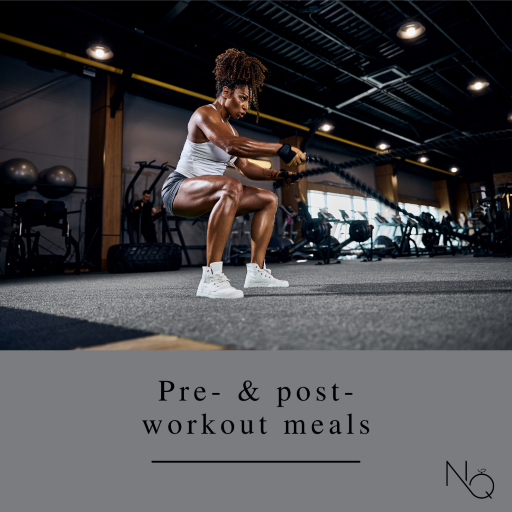A frequent question of those who exercise intensively is what they should eat before and after exercise for better training and performance. These two meals are called the "pre-workout" and "post-workout" meals and are of utmost importance to get the best results from exercise.
Pre-workout meal time
The pre-workout meal is what we consume before training. The time we have it varies, and it has to do with our food tolerance. In general, we suggest that athletes test for themselves at what times would be convenient for them to eat the pre-workout meal on training days rather than on race days. That is because if the amount of food, the timing, or the ratio of the macro-components of the meal (protein, carbohydrates, fats) do not suit us, we will have difficulty training. If the meal is inappropriate, the body will use large amounts of energy for digestion rather than muscle function, or gastrointestinal disturbances will occur. Generally, we should consume the pre-workout meal 1 to 4 hours before training.
Pre-workout meal recommendation
The composition of the pre-workout meal must serve the body's needs, which will exercise. Energy should be in a form that the body can easily use it. This form is carbohydrates since they comfortably enter the bloodstream and are used by various tissues. At the same time, the macro component that contributes to muscle recovery and growth is protein. These are the two main ingredients that it is good to choose before training while, at the same time, keeping fats at a low level because their digestion is slower, and they can "burden" us during training. The same goes for fiber, so we make sure we don't eat too many vegetables and legumes before. Finally, let's not forget that every athlete's meal must be rich in micronutrients (vitamins, trace elements, minerals, antioxidants, etc.) so that they contribute to overall health. Some examples of pre-workout meals are listed below. The quantities are adjusted to the individual and the needs, keeping the fat levels low.
• whole wheat sandwich with peanut butter and banana
• wholemeal sandwich with tahini-honey-banana
• 2% yogurt with cereals and berries
• orange juice and crispbread with low-fat cheese
• raisins with a few almonds
• wholemeal spaghetti with grated low-fat cheese
Post-workout meal time
There is a lot of disagreement over whether we should eat the post-workout meal at a specific time. On the one hand, some say that the best is to eat within the 'anabolic window', meaning within two hours after training, so our body can make anabolic procedures and restore. On the other hand, it appears that the anabolic process and positive adaptations of exercise last for several hours after training. I suggest taking advantage of the 'anabolic window' since many scientific studies support it, and it's a proper time to eat something after our last meal (it's been at least 1 hour of training and 1-4 hours before without food).
Post-workout meal recommendation
The post-workout meal is similar to the pre-workout meal, except that it has no limitation in quantity, fat content, and fiber. As we exercise, our muscles use glucose from glycogen stored in them. At the same time, the intense use of their muscles causes micro-injuries. The purpose of the post-workout meal is, on the one hand, to replenish glycogen stores (through the intake of carbohydrates), on the other hand, to help the muscles in their recovery and development. We will feel the advantages of replenishing glycogen in our next training: it will be much more comfortable, not accompanied by intense fatigue, and more efficient. The quantities in the post-workout meal should always be in line with the needs of each body (height, weight, training phase, workout intensity, level, etc.). Post-workout meal suggestions:
• smoothie with low-fat milk and fruit
• low-fat milk with cocoa
• refined-wild rice, chicken, and boiled vegetables
• grilled salmon with sweet potato
• sweet toast with low-fat cream cheese and fruit




